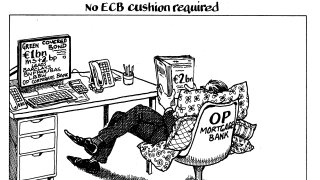Finland
-
It was the most subscribed covered bond of this size issued since January
-
Janne Holkko has been with the bank since 2011
-
Premiums double as central banks and potential war in Ukraine weigh on sentiment
-
Issuer gets ample demand for €3bn 20 year trade, but some say it started cheap
-
Finnish lender's green labelled bail-in debut was over three times covered on Thursday
-
Finnish borrower satisfies higher measures to be considered a regional government by Eurosystem
-
Sale of Sampo stock on Thursday night raises €497m for Finland
-
Antti Saha, head of DCM at Nordea in Helsinki, says the Nordics are 'where the action is'
-
Rise in Romanian interest rates behind pair's widely different coupons
-
Exit from stake in the Nordic region's largest bank follows pressure from an activist hedge fund
-
The Finnish financial services group is focusing on its insurance assets following pressure from activist hedge fund Elliot International
-
Two public sector issuers will come to market for euro trades on Tuesday, testing conditions as the autumn borrowing season gets underway











